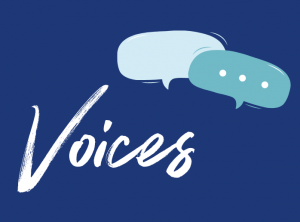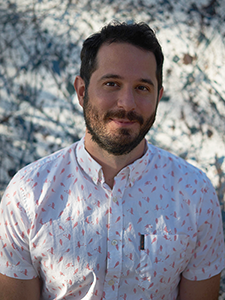Exploring What’s Possible in Public Humanities
Azlan Smith (Creative Writing), current Mellon Pre-Doctoral Public Humanities Fellow and Odyssey Project instructor, writes about their fellowship project, what drew them to this work, and what “public humanities” means to them. Learn more about the Voices project.
Art, research, study, storytelling—all of these are fundamentally public activities. I think a lot of us feel somewhere deep down that the humanities are supposed to be public humanities, that studying and being and engaging are interconnected acts, and then bit by bit grad students are asked to let go of that idea as a pleasant but unrealistic dream. And it’s not a dream. It’s the reality.
What motivated you to apply for the Mellon Pre-Doctoral Public Humanities Fellowship?
In a conversation with scholar Julie Lythcott-Haims I noticed how her insights into the ways we conceptualize parenthood, childhood, success, work, etc. were interspersed with the repeated phrase, “I believe in people.” That belief, that joy and hope in connection, shone through all the scholarship she shared. She focused on how we interact with each other. How we grow. How we depend on each other.
I think that repeated phrase stuck with me because it resonates with the motivation in all the work I’ve done. I teach because I believe in people. I write because I believe in people. I listen because I believe in people. As a writer I like stories, but I love what stories (and attention, and sharing moments) can do for people. I’m interested in the academic disciplines in which I work, and the tools these disciplines offer, but I’m dedicated to initiatives that make those tools practical in people’s lives. This fellowship seemed to share that emphasis. It said, “You know that kind of work you keep wanting to do? We believe in it. We want you to do it.” It gave me the support to do that work.
How do you see the Voices project exemplifying the public humanities in action?
You know, I try not to refer to a book before I’ve finished reading it, because who knows what’s going to happen, but I’m a couple chapters into David Graeber and David Wengrow’s A New Dawn of Everything and there’s a lot in it that’s inspiring. In particular, early on, there’s this moment where the authors talk about the way we’re taught to accept so many of our society’s ills as inevitable. We don’t want such a big wealth gap, we don’t want a society where money translates so easily into power over other people, but “that’s just how it is.” We’re taught it’s what happens once “civilization” moves into specialization, hierarchy, etc. One of the books’ central contentions is that these characteristics are in fact by no means necessary. That has me thinking, because so many of the separations I’m taught to hold between knowledge and action, between the so-called “academy” and surrounding so-called “communities,” just seem like lies.

Art, research, study, storytelling—all of these are fundamentally public activities. I think a lot of us feel somewhere deep down that the humanities are supposed to be public humanities, that studying and being and engaging are interconnected acts, and then bit by bit grad students are asked to let go of that idea as a pleasant but unrealistic dream. And it’s not a dream. It’s the reality.
What I do is gather, weave together, and stage stories from inside a community. I wouldn’t say that my Voices project “exemplifies” the public humanities, because one of the things about public lives (as interconnected, engaged, embodies experiences) is that they’re incredibly complex and varied. There are so many different ways to (for instance) engage with stories as a way to explore different ways of being in the world, building connections, and supporting each other. The way that my project likes to walk is this one: what if we, in person, had a space in which to talk more about what’s really going on for us, and to listen more to what’s really going on for each other?
A lot of our current systems (from social media to the publishing marketplace) tend to focus our attention on a few “brilliant” / “important” / “famous” / “award-winning” / “98% match” voices. The Voices project partners with a community who is interested in directing our attention back toward the tapestry of who we are together. In that way, it’s one example of public humanities in action, and it’s using “academic” tools (including ideas from oral history, verbatim theater, creative writing, and so on) to create collaborations outside of “academia.” But one of the wonders of actual life is how diverse it is.
Roxane Gay spoke at UIUC a few weeks ago, and she said something like, “Universality is where creativity goes to die.” She wanted something that’s grounded, that’s situated, that’s specific. I suppose Voices mixes that with artist Thomas Hirshikorn’s famous dictum, “Energy yes. Quality no.”
Maybe I want to free us from being exemplary anything. I certainly don’t want to make any voice “stand in” for some kind of perspective. I want to listen to someone as themselves, and I want to listen to their community as a shared, interwoven experience. And then I want to wonder, when we hear each other more, what’s possible?
